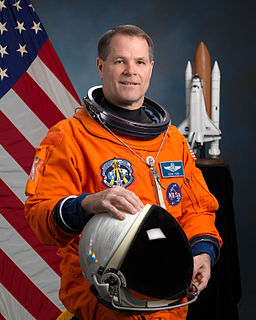A Quote by George Will
The greatest threat to civility - and ultimately civilization - is an excess of certitude. The world is much menaced just now by people who think that the world and their duties in it are clear and simple. They are certain that they know what - who - created the universe and what this creator wants them to do to make our little speck in the universe perfect, even if extreme measures - even violence - are required.
Related Quotes
One can imagine that God created the universe at literally any time in the past. On the other hand, if the universe is expanding, there may be physical reasons why there had to be a beginning. One could imagine that God created the universe at the instant of the big bang, or even afterwards in just such a way as to make it look as though there had been a big bang, but it would be meaningless to suppose that it was created before the big bang. An expanding universe does not preclude a creator, but it does place limits on when he might have carried out his job!
I think the Bible is completely inspired by God in its overall messages. But, for the people of those days to know what was going to happen 4,000 years later in a world of astronomy or subatomic particles. They didn't have access to the knowledge that we presently have about geology. So, we know now that the world was created many of billions of years ago, 13 or 14 billion years ago. As far as they knew, the earth was the center of the universe. They thought that stars were little twinkling things in the sky where as now we know stars are very distant and much larger than the earth.
We're all going through so much hard, wonderful, amazing . . . it's blessings; it's lessons; it's hardship; it's life. I guess, I don't know what the definition of life is. I now know the meaning of my life, because of my daughters, but mine is one little tiny speck in the universe. It's nice to not be pretending everything is perfect all the time, because it isn't, but I do love happiness and joy and optimism.
There is a certain sense in which I would say the universe has a purpose. It's not there just somehow by chance. Some people take the view that the universe is simply there and it runs along-it's a bit as though it just sort of computes, and we happen by accident to find ourselves in this thing. I don't think that's a very fruitful or helpful way of looking at the universe, I think that there is something much deeper about it, about its existence, which we have very little inkling of at the moment.
I've always been an escapist, I guess, and I spend so much time on the internet absorbing ideas and processing the horrors of the world that when I'm actually going to read for pleasure, it's always something ridiculous about a dragon. I'm so saturated with the injustice and torment of the real world that it's really hard for me to get myself to read anything that's even set in our universe, because I'm exhausted by our universe.
Of course, Jastrow's comment is exaggerated at best; theologians hardly predicted the Big Bang. If our universe turns out to be closed, hence with an end, this does not mean apocalyptic visions of the end of the world were on target. And even if a beginning for the universe is a successful prediction of one version of theism, this is still not that impressive. After all, even a stopped clock is right twice a day. The Big Bang becomes strong support for God only with an argument showing that such a beginning requires a Creator.
If, as you believe there is an Almighty, Omnipresent, Omniscient God, who created the earth or universe, please let me know, first of all, as to why he created this world. This world which is full of woe and grief, and countless miseries, where not even one person lives in peace....Where is God? What is He doing? Is He getting a diseased pleasure out of it? A Nero! A Genghis Khan! Down with Him!
Our universe cannot even be stated symbolically. And this touches us all more directly than one might suppose. For example, artists, who have been very little influenced by social systems, have always responded instinctively to latent assumptions about the shape of the universe. The incomprehensibility of our new cosmos seems to me, ultimately, to be the reason for the chaos of modern art.
Some days,' I say, 'I feel like I don't belong anywhere in that world. That world out there. 'I point to Grant. 'People walk down our street and people drive down it and people ride their bicycles down it and all of them, even the ones I know, could be from another planet. And I'm a visiting alien.' And aliens don't belong anywhere,' Adam finishes for me, 'except in their own little corners of the universe.' Right,' I say. ~pgs 57-58 Hattie and Adam on alienation
The threat from Iran is, of course, their stated objective to destroy our strong ally Israel. That's a threat, a serious threat. It's a threat to world peace; it's a threat, in essence, to a strong alliance. I made it clear, I'll make it clear again, that we will use military might to protect our ally, Israel.
We in astrophysics we think of the universe all the time. So to us, Earth is just another planet. From a distance, it's a speck. And I'm convinced that if everyone had a cosmic perspective you wouldn't have legions of armies waging war on other people because someone would say, "Stop, look at the universe."

































